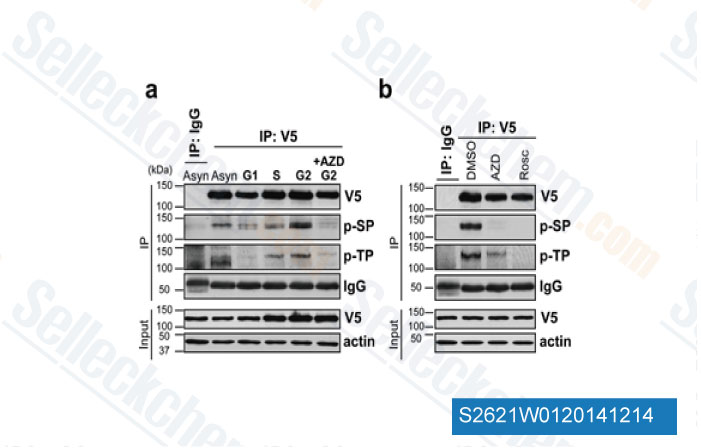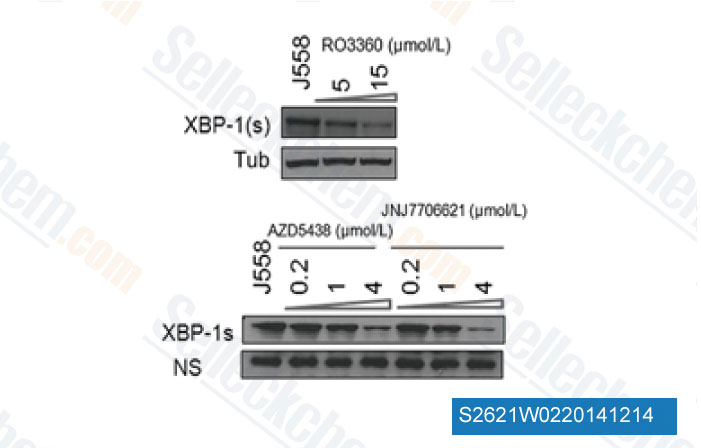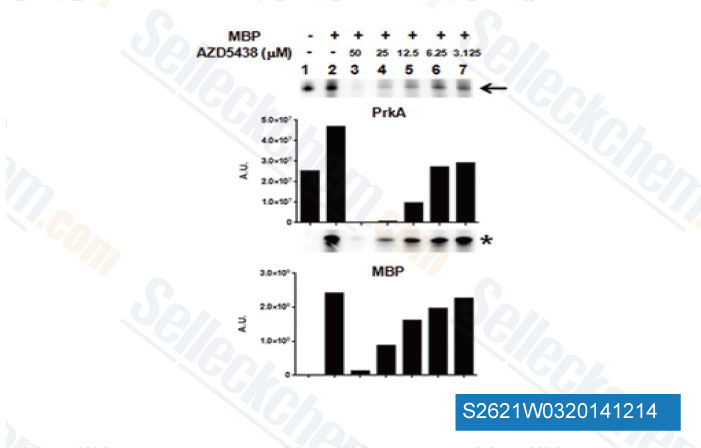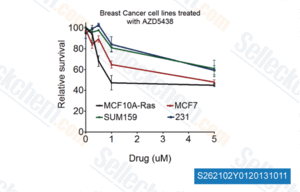|
How to Cite 1. For In-Text Citation (Materials & Methods): 2. For Key Resources Table: |
||
|
Toll Free: (877) 796-6397 -- USA and Canada only -- |
Fax: +1-832-582-8590 Orders: +1-832-582-8158 |
Tech Support: +1-832-582-8158 Ext:3 Please provide your Order Number in the email. We strive to reply to |
Technical Data
| Formula | C18H21N5O2S |
||||||
| Molecular Weight | 371.46 | CAS No. | 602306-29-6 | ||||
| Solubility (25°C)* | In vitro | DMSO | 74 mg/mL (199.21 mM) | ||||
| Ethanol | 74 mg/mL (199.21 mM) | ||||||
| Water | Insoluble | ||||||
| In vivo (Add solvents to the product individually and in order) |
|
||||||
|
* <1 mg/ml means slightly soluble or insoluble. * Please note that Selleck tests the solubility of all compounds in-house, and the actual solubility may differ slightly from published values. This is normal and is due to slight batch-to-batch variations. * Room temperature shipping (Stability testing shows this product can be shipped without any cooling measures.) |
|||||||
Preparing Stock Solutions
Biological Activity
| Description | AZD5438 is a potent inhibitor of CDK1/2/9 with IC50 of 16 nM/6 nM/20 nM in cell-free assays. It is less potent to CDK5/6 and also inhibits GSK3β. | ||||||
|---|---|---|---|---|---|---|---|
| Targets |
|
||||||
| In vitro | AZD5438 exhibits the potent inhibitory effect on activity of cyclin-dependent kinases including cyclin E-cdk2, cyclin A-cdk2, cyclin B1-cdk1, cyclin D3-cdk6, and cyclin T-cdk9 with IC50 of 6 nM, 45 nM, 16 nM, 21 nM, and 20 nM, respectively. Besides, this compound also inhibits the kinase activity of p25-cdk5 and glycogen synthase kinase 3β with IC50 of 14 nM and 17 nM, respectively. It induces cell cycle arrest by inhibiting phosphorylation of cdk-dependent substrates, and exhibits the broad antiproliferative activity against a range of tumor cell lines including lung, colorectal, breast, prostate, and hematologic tumors with IC50 ranging from 0.2 μM (MCF-7) to 1.7 μM (ARH-77). |
||||||
| In vivo | In vivo, oral treatment of AZD5438 leads to statistically significant inhibition against the growth of human tumor xenografts derived from a wide range of different cancer types including breast, colon, lung, prostate, and ovarian with maximum TGI ranging from 38% to 153%. In the SW620 xenograft model, this compound causes the inhibition of several cell cycle proteins such as, phH3, phosphonucleolin, PP1a, and several phospho-pRb epitopes in a dose-dependent manner. |
||||||
| Features | A potent inhibitor of cyclin-dependent kinase (CDK) 1, 2, and 9. |
Protocol (from reference)
| Kinase Assay: |
|
|---|---|
| Cell Assay: |
|
| Animal Study: |
|
References
|
Customer Product Validation

-
Data from [ Nat Commun , 2014 , 5, 3561 ]

-
Data from [ Mol Cancer Ther , 2014 , 13(3), 662-74 ]

-
Data from [ Antimicrob Agents Chemother , 2014 , 58(8), 4486-94 ]

-
, , Helen Sadik from Johhns Hopkins University
Selleck's AZD5438 Has Been Cited by 26 Publications
| Combined therapy with DR5-targeting antibody-drug conjugate and CDK inhibitors as a strategy for advanced colorectal cancer [ Cell Rep Med, 2025, S2666-3791(25)00231-9] | PubMed: 40449480 |
| DSCC1 restrains 53BP1/RIF1 signaling at DNA double-strand breaks to promote homologous recombination repair [ Cell Rep, 2025, 44(4):115452] | PubMed: 40117291 |
| A Huluwa phosphorylation switch regulates embryonic axis induction [ Nat Commun, 2024, 15(1):10028] | PubMed: 39562571 |
| Proteogenomics of diffuse gliomas reveal molecular subtypes associated with specific therapeutic targets and immune-evasion mechanisms [ Nat Commun, 2023, 14(1):505] | PubMed: 36720864 |
| Nascent transcriptome reveals orchestration of zygotic genome activation in early embryogenesis [ Curr Biol, 2022, 32(19):4314-4324.e7] | PubMed: 36007528 |
| Identification of New Vulnerabilities in Conjunctival Melanoma Using Image-Based High Content Drug Screening [ Cancers (Basel), 2022, 14(6)1575] | PubMed: 35326726 |
| Phenotypic Screening for Small Molecules that Protect β-Cells from Glucolipotoxicity [ ACS Chem Biol, 2022, 10.1021/acschembio.2c00052] | PubMed: 35439415 |
| Whole-exome sequencing of alpha-fetoprotein producing gastric carcinoma reveals genomic profile and therapeutic targets [ Nat Commun, 2021, 12(1):3946] | PubMed: 34168152 |
| Trapping KSHV in Latency-Exploring Kinase Inhibitors as a Class of Anti-Virals that Target the KSHV Lytic Cycle [ ProQuest, 2021, 28714138] | PubMed: None |
| Integrative discovery of treatments for high-risk neuroblastoma. [ Nat Commun, 2020, 11(1):71] | PubMed: 31900415 |
RETURN POLICY
Selleck Chemical’s Unconditional Return Policy ensures a smooth online shopping experience for our customers. If you are in any way unsatisfied with your purchase, you may return any item(s) within 7 days of receiving it. In the event of product quality issues, either protocol related or product related problems, you may return any item(s) within 365 days from the original purchase date. Please follow the instructions below when returning products.
SHIPPING AND STORAGE
Selleck products are transported at room temperature. If you receive the product at room temperature, please rest assured, the Selleck Quality Inspection Department has conducted experiments to verify that the normal temperature placement of one month will not affect the biological activity of powder products. After collecting, please store the product according to the requirements described in the datasheet. Most Selleck products are stable under the recommended conditions.
NOT FOR HUMAN, VETERINARY DIAGNOSTIC OR THERAPEUTIC USE.
